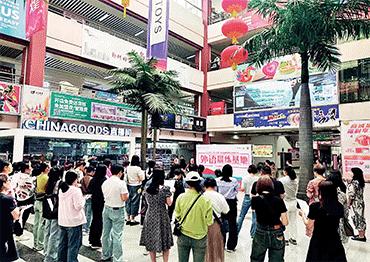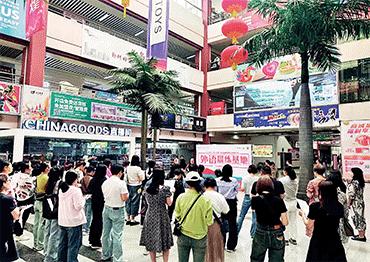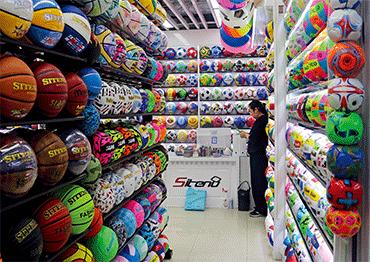Wen said his transition to original designs has given him more leverage at the negotiating table.
“Tough negotiations with customers or accusations of IP infringement can squeeze every possible margin from manufacturers, who rely solely on their assembly lines,” he told NewsChina. “However, with original designs, I can assert more control over pricing,” he added, mentioning that he has obtained product licenses for World Cup 2026 to be hosted by the US, Canada and Mexico.��
Between January and March, Yiwu’s exports of sportswear and equipment hit 1.86 billion yuan (US$260m), up 51.9 percent year-on-year. Soccer balls alone contributed 450 million yuan (US$61.88m), soaring by 73.9 percent year-on-year.
Huang attributed this exponential growth to the previous year, when local businesses were still recovering from the pandemic’s impact. But with overseas demand and exports rebounding after the three-year pandemic, competition among suppliers in Yiwu intensified.
About 100 more stores in Yiwu’s small commodity markets started to sell soccer balls as the Qatar World Cup 2022 approached, Wu Xiaoming, chairman of equipment maker Yiwu Aokai Sports and director of the Yiwu Sports Goods Association, told NewsChina. In 2022, the cheapest soccer ball cost 8 yuan (US$1), two yuan more than the current price.
“With lower thresholds for investments and technologies, Yiwu’s sports industry, particularly its soccer products, always heats up once every four years. But after the fervor dies down, most suppliers slash prices to clear their inventories,” Wu said.
At its peak, Yiwu was home to 70 soccer ball factories. But as labor and rent costs increased, most moved to Henan, Anhui, Sichuan and Guizhou provinces. Only four remain in Yiwu.
Wu has kept his factory capacity at 120,000 balls a month to concentrate on quality and attract high-end customers.
“Soccer ball orders from the US and Europe are declining and medium- and low-end products are hardly profitable. All in all, our orders have declined tenfold,” an anonymous local soccer ball producer and seller told NewsChina.
Every major sports event creates a large supply chain. During Qatar 2022, Wu’s factory shipped one million soccer balls, 100,000 of which went to a wealthy Qatari customer whose company also sponsored the World Cup.
Yiwu is also seeing fewer orders for Paris Olympics products.
“The decline of consumer purchasing power in Europe has prompted EU clients to look toward less costly suppliers in countries like Vietnam, Pakistan and India,” Wu said.
To address the changing landscape while avoiding the price wars that plagued Yiwu manufacturers in the past, Wu with the Yiwu Sports Goods Association focused his factory on producing league-standard soccer balls and pursuing direct cooperation with overseas soccer clubs and associations.
“From the perspective of the industry association, we urge businesses to focus on personalization, branding and developing product lines. We encourage them to establish their own product standards for corresponding price ranges,” Wu said, adding “This way, we can approach the market differently and find the customers who suit us most.”

 Old Version
Old Version

